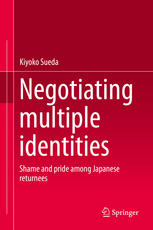

Most ebook files are in PDF format, so you can easily read them using various software such as Foxit Reader or directly on the Google Chrome browser.
Some ebook files are released by publishers in other formats such as .awz, .mobi, .epub, .fb2, etc. You may need to install specific software to read these formats on mobile/PC, such as Calibre.
Please read the tutorial at this link: https://ebookbell.com/faq
We offer FREE conversion to the popular formats you request; however, this may take some time. Therefore, right after payment, please email us, and we will try to provide the service as quickly as possible.
For some exceptional file formats or broken links (if any), please refrain from opening any disputes. Instead, email us first, and we will try to assist within a maximum of 6 hours.
EbookBell Team

4.0
66 reviewsThis book uses a post-modern approach to explore how Japanese returnee students (kikokushijo) and former returnees who work in Japanese industry, negotiate multiple identities. Methodological triangulation is used to study inner perception of face, emotional state and the dynamics of negotiating multiple-layering of identities. The work considers the relationship between face and identities, and the function of the affective aspects of face, shame and pride in identity negotiation.
Readers will discover how Japanese returnees deal with shame and pride in face-threatening or face-promoting situations that affect their identity negotiation. Many such returnees stayed abroad because of their parents’ jobs and the author explores variations among them, in terms of how they identify with their identity as a returnee. We discover how there are multiple levels of identities instead of ‘identity’ as a singular.
Two phases of research, carried out across ten years and involving some participants in both phases, are explored in this work. Although the participants in the research are Japanese returnees, the findings drawn from the study have implications for others who spend an extensive period of time overseas, who migrate from one place to another or who have multiple cultural backgrounds.
The book incorporates ideas from Western and Eastern literature on intercultural communication, sociology and social psychology and it blends both micro and macro analysis.
This book is recommended for scholars, educators, students and practitioners who seek to understand better how people negotiate their multiple identities in this globalising world.